Intel NUC 13 Pro Arena Canyon Review: Raptor Lake Brings Incremental Gains
by Ganesh T S on March 27, 2023 9:00 AM ESTSystem Performance: Multi-Tasking
One of the key drivers of advancements in computing systems is multi-tasking. On mobile devices, this is quite lightweight - cases such as background email checks while the user is playing a mobile game are quite common. Towards optimizing user experience in those types of scenarios, mobile SoC manufacturers started integrating heterogeneous CPU cores - some with high performance for demanding workloads, while others were frugal in terms of both power consumption / die area and performance. This trend is now slowly making its way into the desktop PC space.
Multi-tasking in typical PC usage is much more demanding compared to phones and tablets. Desktop OSes allow users to launch and utilize a large number of demanding programs simultaneously. Responsiveness is dictated largely by the OS scheduler allowing different tasks to move to the background. Intel's Alder Lake processors work closely with the Windows 11 thread scheduler to optimize performance in these cases. Keeping these aspects in mind, the evaluation of multi-tasking performance is an interesting subject to tackle.
We have augmented our systems benchmarking suite to quantitatively analyze the multi-tasking performance of various platforms. The evaluation involves triggering a ffmpeg transcoding task to transform 1716 3840x1714 frames encoded as a 24fps AVC video (Blender Project's 'Tears of Steel' 4K version) into a 1080p HEVC version in a loop. The transcoding rate is monitored continuously. One complete transcoding pass is allowed to complete before starting the first multi-tasking workload - the PCMark 10 Extended bench suite. A comparative view of the PCMark 10 scores for various scenarios is presented in the graphs below. Also available for concurrent viewing are scores in the normal case where the benchmark was processed without any concurrent load, and a graph presenting the loss in performance
| UL PCMark 10 Load Testing - Digital Content Creation Scores | |||
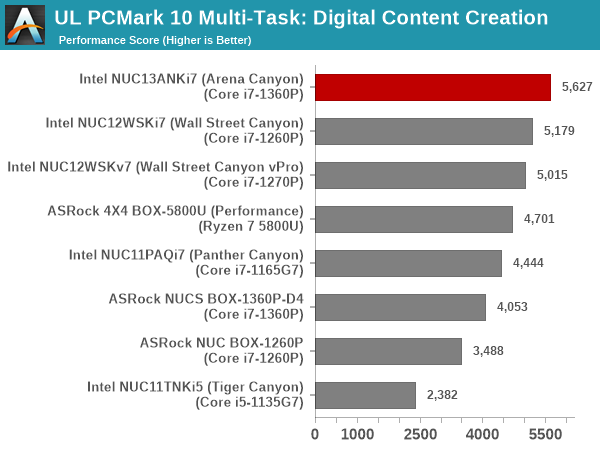
| UL PCMark 10 Load Testing - Productivity Scores | |||
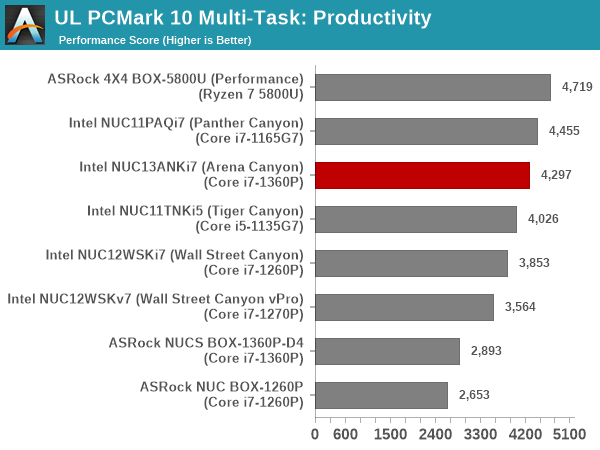
| UL PCMark 10 Load Testing - Essentials Scores | |||
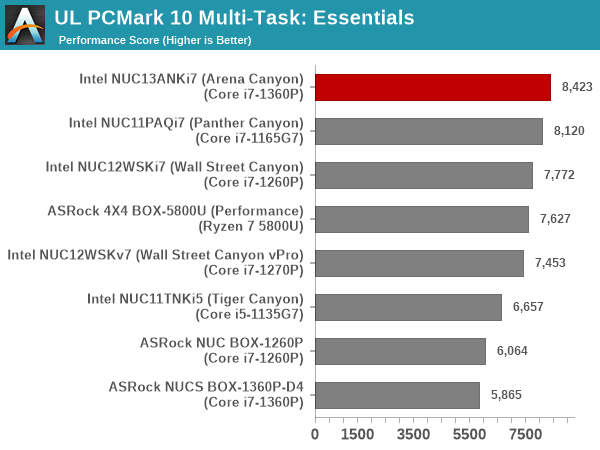
| UL PCMark 10 Load Testing - Gaming Scores | |||
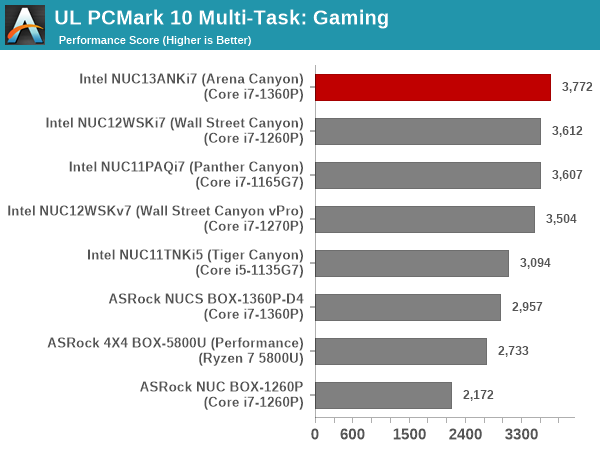
| UL PCMark 10 Load Testing - Overall Scores | |||
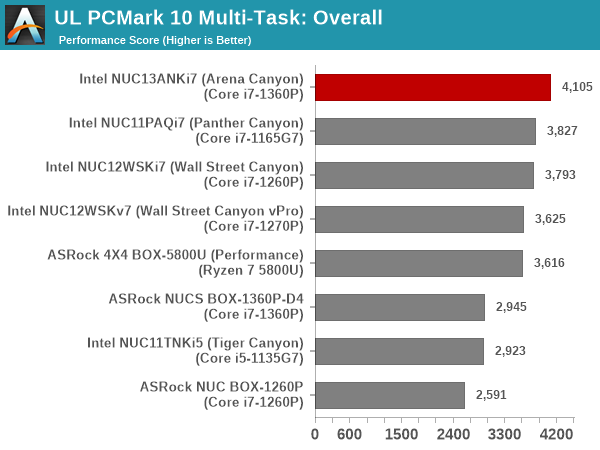
All PCMark 10 workload components see the relative ordering being maintained even after the addition of the concurrent loading.
Following the completion of the PCMark 10 benchmark, a short delay is introduced prior to the processing of Principled Technologies WebXPRT4 on MS Edge. Similar to the PCMark 10 results presentation, the graph below show the scores recorded with the transcoding load active. Available for comparison are the dedicated CPU power scores and a measure of the performance loss.
| Principled Technologies WebXPRT4 Load Testing Scores (MS Edge) | |||
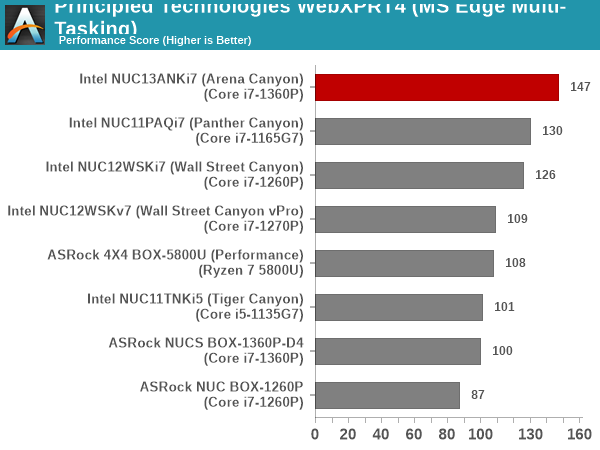
Despite a 50% performance loss, the NUC13ANKi7 retains a signficant lead over the other systems in webXPRT4 in the presence of the transcoding workload.
The final workload tested as part of the multitasking evaluation routine is CINEBENCH R23.
| 3D Rendering - CINEBENCH R23 Load Testing - Single Thread Score | |||
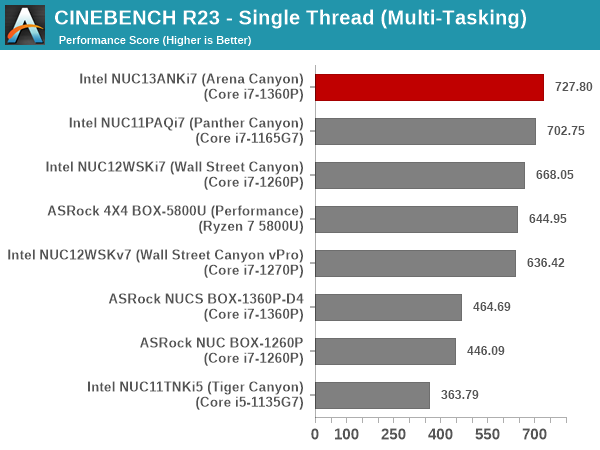
| 3D Rendering - CINEBENCH R23 Load Testing - Multiple Thread Score | |||
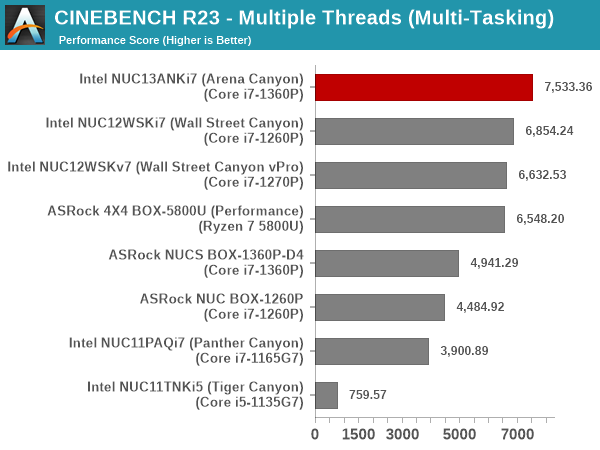
We see a 60%+ drop in the single thread case, and a 40%+ drop for the multi-threaded case, but the raw numbers are still well in favor of the NUC13ANKi7.
The latest version of Windows 11 (22H2) apparently has some additional thread scheduling improvements that can help Alder Lake and Raptor Lake deliver better / more balanced performance for multi-tasking scenarios. We may get a chance to evaluate that a few quarters down the line.










46 Comments
View All Comments
hmurchison - Monday, March 27, 2023 - link
NUC are useless. Plastic computers with huge external power supplies yet people are actually trying to defend this shit. There's a reason why PC sales are in the sh***ter. For decades PC fanboys vomited out how much PC they could buy/build for the price we bought our Mac. Now PC aren't even that affordable. I'd rather buy a M2 Mini as well. I got Thunderbolt, easy upgrade to 10G networking. The PC industry is beyond boring right now.meacupla - Monday, March 27, 2023 - link
I think it's funny you think PC sales are being eaten up by macs.They're not.
The largest market share is from smartphones, and it's primarily Android that has been eating Windows PC market share.
The breakdown of share is basically this
43.9% Android
27.7% Windows
17.1% iOS
6.2% OSX
5.1% Other and Unknown
MrCommunistGen - Monday, March 27, 2023 - link
I don't understand the animosity that exists in the Mac vs non-Mac camps. I have and have used both platforms -- Macs since around 1990 and Windows PCs since around 2002 and continue to use both in my professional career. Each has their place and use cases.Just because a product doesn't match your world-view, regardless of which platform you prefer, doesn't make the other worthless or useless.
Regardless of which platform ultimately takes the performance crown, M2, M2 Pro, etc or Raptor Lake, there's no denying that the various iterations of Apple Silicon have amazing perf/W which is especially beneficial in laptop form-factors. It's also really nice for quiet, high performance computing in small form factors, whether that's a SFF desktop or a laptop.
That said, there are also advantages to the upgradeability of non-Apple devices. The ability to upgrade RAM or storage down the road, whether due to budget limitations at the original time or purchase, or whether you're taking advantage of lower prices in the future can help REDUCE eWaste by allowing an otherwise adequate machine to continue to be used rather than discarded.
It doesn't help Apple's case that in addition to being non-upgradeable they DO charge pretty high prices for upgrading RAM or storage on their machines. +$200 for upgrading from 8GB of RAM to 16GB, or from 256GB of SSD to 512GB is pretty steep (especially since Apple is paying bulk prices) when as an individual you can buy either a 64GB DDR4 3200 SO-DIMM kit or 2TB NVMe SSD for less than $150 at retail.
To directly address the claim that NUCs are useless:
These aren't designed for your average home user. That's not to say that an average home user can't or shouldn't buy a NUC. But really, one of the major intended audience is big corporate offices where the NUC can be VESA mounted to the back of a display and the power brick can be stashed away under a desk.
Also, MOST non-Atom/Pentium/Celeron NUCs (including the 13th generation models in this article) have Thunderbolt.
Circling back to what I hope my key takeaway is:
Can't we all just agree that we all like tech and that new technology is cool rather than just needing to bash on whoever has a different opinion than us?
Samus - Tuesday, March 28, 2023 - link
Ditto. I use both. In fact I have an iPhone, iPad, Intel i7 custom-built gaming PC, Ryzen 5600G HTPC for media, 8th Gen Dell Latitude work laptop and my old Macbook Air for when I need OSX for something like testing a clients software. I have a Pixel 3 without cellular connection to fly my drone (because frankly the iPad and iPhone suck for this) and use Android and Raspberry Pi's for projects of all kinds. I've considered getting an M2-based laptop as soon as they are financially viable to replace my aging iPad Pro as my kitchen table media toy.This is the definition of a competitive industry benefiting the consumer and pushing technology forward. EVERYTHING HAS ITS APPLICATION.
ingwe - Tuesday, March 28, 2023 - link
Spot on. I also don't understand the need to be a fanboy of these gigantic companies that care nothing for individuals.I'm perfectly happy to use whatever fits my application.
block2 - Tuesday, April 4, 2023 - link
Been building PCs since 1999 and do not recall upgrading any. Once they need more RAM the CPU is also too slow. I replaced HD with SSD many years ago before many people had SSD which was huge upgrade. Still using that PC (2.8Ghz AMD Phenom II)!!!Pixol22 - Tuesday, March 28, 2023 - link
I'm pretty sure this is bait, but I'll bite. NUCs are not useless, because NUCs are real computers. Mac minis are gimmick computers more alike to an iPhone than a desktop computer. If you buy a NUC, you can use it to run or host anything you'd like, between multiple operating systems. Yes it matters to me if hardware is supported by Linux or not. You can also upgrade components using industry standard technologies like M.2, SODIMM, SATA. Apple exists in this strange bubble outside the industry and at every single opportunity they will screw over their customers with crazy pricing, hostile repair practices, and expertly designed price brackets designed to cause distress in customers so they just spend $200 more...$200 more...$100 more. Also, I am not sure how you came to the conclusion that PCs are more expensive, as AMD and Intel have caught up to Apple Silicon, and PC manufacturers offer more competitive upgradeable components for a lower cost.Pixol22 - Tuesday, March 28, 2023 - link
As a M1 Mac mini owner, been there, done that. There is a lot to like about that computer, but a lot more limitations that make it so infuriating. First, Apple starts those machines at $600 but Apple charges a whopping $200 for an extra 8 GB of ram, which is ridiculous. Then you have to pay $200 extra for 512gb of storage instead of 256gb of storage. Apple's flash isn't even particularly fast, and it is soldered. So all those people that would worry about SSD failure, I hope you are comfortable de-soldering flash. (If such a thing is possible.) Another annoyance is the base configuration with the M2 has a very limited display engine on the GPU, which means you only get two monitors, and the built in HDMI port is more problematic than its worth as it constantly limits resolution, refresh rate, HDR, and variable refresh rate. Perhaps worst of all, the Mac mini comes with macOS and there is no choice to change the operating system, even though there has been some progress on reverse engineering, it is not useful. Running a server or something on a Mac mini is simply painful. I suggest that most people avoid the Mac mini even though the marketing seems appealing.abufrejoval - Tuesday, March 28, 2023 - link
My oranges have 64GB of RAM not 8GB, and 2TB of NVMe not 250GB.And I use 10Gbit networking via TB, because they run containers and VMs as µ-servers, not sure if Apple allows NICs they don't sell.
You can't even get 64GB of RAM from a Mini, while it's €120 including taxes on Intel or AMD.
You fancy 8TB of NVMe next year, no issue swapping the stick, some NUCalikes offer a 2nd slot.
I seriously wouldn't mind an Apple SoC in my Linux systems, but not with the ballast of MacOS or the prices they charge for meaningful configurations.
Fenturi - Tuesday, March 28, 2023 - link
Until the SSD runs out. Apple needs to not make systems that can't swap the SSD and RAM, none upgradeability on the SSD is a deal breaker.